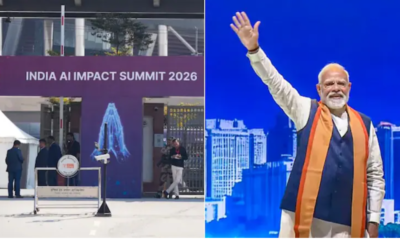The Supreme Court on Wednesday, March 7 ruled that Aadhaar cards would not be mandatory students appearing in NEET 2018 and other all India exams.
Delivering the order, a five-judge Constitution bench, headed by Chief justice Dipak Misra and comprising Justices AK Sikri, AM Khanwilkar, DY Chandrachud and Ashok Bhushan, directed the CBSE to upload the information on their website.
The CJI, addressing the respondents, said that they need to follow the court’s interim order which said Aadhaar cannot be made mandatory.
Earlier, in the morning, the Unique Identification Authority of India (UIDAI) had told the apex court that it has not authorised CBSE to mandatorily take Aadhaar number of students to get themselves enrolled for appearing in NEET 2018 examination.
Attorney-General KK Venugopal had said he has instructions from UIDAI that like in Jammu and Kashmir, Meghalaya and Assam other identity proofs like passport, voter card and ration card can be used by the CBSE for enrolling the students in the examination.
The UIDAI’s remarks came on a plea challenging the decision of CBSE seeking Aadhaar number or Aadhaar enrolment number from students who are aspiring to take up the NEET 2018 examination.
The Gujarat High Court had dismissed the plea on February 27 and its order was challenged in the Supreme Court.
Senior counsel Arvind Datar, arguing for petitioners, said that the forced use of Aadhaar for availing of several services is amounting to almost coercion. He gave the example of a driving licence (Motor vehicles Act), where you will not be deprived of benefits accruing because you do not have a licence.
He made a clear point in this. He said: “If it wasn’t a money bill and had gone to the Rajya Sabha, Section 57 of the Aadhaar Act wouldn’t have been passed.”
[Section 57 says that the Act is “not to prevent use of Aadhaar number for other purposes under law. Nothing contained in this Act shall prevent the use of Aadhaar number for establishing the identity of an individual for any purpose, whether by the State or any body corporate or person, pursuant to any law, for the time being in force, or any contract to this effect…”]
Datar said: “Consent is said to be free without any coercion, but in the present scenario there’s a coercion; so much so that if your Aadhaar is not linked your account will be closed.”
He said: “To enroll or not to enroll is my wish. When I exercise this right, I do not exercise in reference to Sec.3 of the Aadhaar Act, but because of my right to privacy. Under rule of law, is it permissible to coerce at every stage? This is what your lordships must decide. Sec.8(2)(a) is rendered irrelevant now, because the consent part has been removed by authorities under this section and will be closed on this March 31,” he said.
[Sec.8(2)(a) of Aadhaar Act says: “unless otherwise provided in this Act, obtain the consent of an individual before collecting his identity information for the purposes of authentication in such manner as may be specified by regulations.”]
He said Aadhaar is a choice. “But if I don’t take Aadhaar, I cannot link it with PAN card which has been mandated. This will mean as if I never had a PAN card because it will cancel my PAN card. After Puttuswamy case, this is my decision with my privacy, on whether to take Aadhaar or not. Article 14,19 and 21 entitles me not to take Aadhaar.”
Datar pointed out various orders of the court. “Twenty nine applications were made for relaxing the orders of the court which prayed that Aadhaar must not be mandatory for filling of forms. It is voluntary,” he said.
He also said: “A total of 2,000 applicants could not fill forms for their exams in state of Gujarat, because they did not have Aadhaar.”
At this point that the CJI said that this writ was useless. Justice Misra said that the high court’s interim stay, saying Aadhaar cannot be made mandatory will have to be abided by.
Justice Chandrachud also made it clear that the interim order passed in October 2015 will stay till the time matter is disposed off.
Extension of deadline
One senior advocate also mentioned that the deadline for linking of documents to Aadhaar must also be extended beyond March 31.
Chidambaram submits
Senior advocate P Chidambaram, starting his submission, said that the Aadhaar bill has been passed as a money bill so as to bypass the Rajya Sabha. He pointed to Article 110 and he pointed out the difference between 117 (financial bill) and 110 (money bill). He said that a financial bill can be a bill which is related to provisions from a-f and others also but a money bill can only be related to provisions between a-f.
A money bill is a subset of financial bill which is a subset of a bill. He submits that nothing escapes in a guise of a money bill.
The matter continues.


 Latest world news16 hours ago
Latest world news16 hours ago
 Latest world news17 hours ago
Latest world news17 hours ago
 Latest world news16 hours ago
Latest world news16 hours ago
 India News16 hours ago
India News16 hours ago
 India News7 hours ago
India News7 hours ago
 Latest world news7 hours ago
Latest world news7 hours ago














